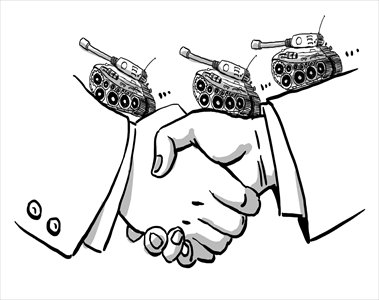HOME >> OP-ED
Russia takes larger view on Southeast Asian affairs
Source:Global Times Published: 2013-8-12 21:48:01

Illustration: Liu Rui/GT
It is reported that Russia will deliver the first of the six naval diesel-powered submarines of "Project 636M Varshavyanka" class to Vietnam in November. According to a military deal between Russia and Vietnam signed in 2009, all the six Kilo-class variants are scheduled for handover to the Vietnamese navy by 2016.Russia's move has aroused heated controversy, especially at this critical moment when Vietnam is engaged in fierce disputes with China over islands in the South China Sea.
Some analysts think the decision actually demonstrates Russia's intention to respond to a rising China through increased military cooperation with Vietnam, one of the claimants to the oil and gas-rich Nansha and Xisha islands in the South China Sea.
Nevertheless, it goes a little too far to say that Russia aims at threatening China by providing submarines and crews as well as training Vietnamese military specialists.
Russia has a tradition of military cooperation with Vietnam. The Treaty of Friendship and Cooperation between the USSR and the Socialist Republic of Vietnam, characterized by military coordination, was signed in 1978 in Moscow. What's more, every sovereign state has the right to choose which countries to cooperate with. Neither Russia nor Vietnam should be blamed for signing such a military deal.
Objectively, Vietnam's increasing military strength will definitely exert a negative influence upon the peaceful settlement of the South China Sea disputes, but it is not fair to say that the Kremlin targets Beijing.
Russian Defense Minister Sergei Shoigu held quiet talks with his Vietnamese counterpart Phung Quang Thanh in Hanoi this April. The two sides discussed the possibility of Russian specialists using the military base in Cam Ranh Bay, which was once used by the Soviet and then the Russian navies but abandoned in 2002 due to lack of funds.
While visiting Moscow last week, the Vietnamese defense minister welcomed Russia to use Cam Ranh military base.
A return to Cam Ranh Bay will help strengthen Russia's position in Southeast Asia. The former superpower that once balanced US hegemony is now facing new challenges as Washington quickens steps in its "pivot to Asia" strategy.
The Kremlin may feel responsible for security and stability in this region, and therefore makes military readjustment by expanding investment in military buildup and equipment.
Moreover, Russia's assistance for Vietnam today should be viewed differently from that during the Cold War, when the Soviet Union regarded the US as its major rival and had a contentious relationship with China.
Currently, Moscow is trying to establish a good relationship with China as both are obliged to maintain the security of the Asia-Pacific region. The growing US military presence in the strategically important region is of particular concern for Russia.
Besides a possible return to Cam Ranh Bay, Moscow also holds joint military drills with Beijing, another sign of Russia increasingly participating in Asian affairs.
Nonetheless, such participation will be unlikely to trigger fundamental changes in the architecture of Southeast Asia, which is decided by the reciprocal constraints of several powers including the US and China. Nor will its decision bring challenge to China's security.
China should view Russia's role positively and address the international row over the South China Sea through consultations from a long-term perspective.
Beijing is supposed to forge a new effective mechanism of security cooperation in concerted efforts with Russia and other countries in Southeast Asia if possible. And such a mechanism should be controllable and predictable, which would be conducive to peace and stability in this region.
China had better keep a larger picture in mind, looking to strategic needs and diplomatic solutions. A comprehensive approach may let the South China Sea disputes work themselves out.
The article was compiled by Global Times reporter Wang Xiaonan based on an interview with Wang Lijiu, a research fellow with the Institute of Russian Studies at China Institutes of Contemporary International Relations. wangxiaonan@globaltimes.com.cn
Posted in: Viewpoint